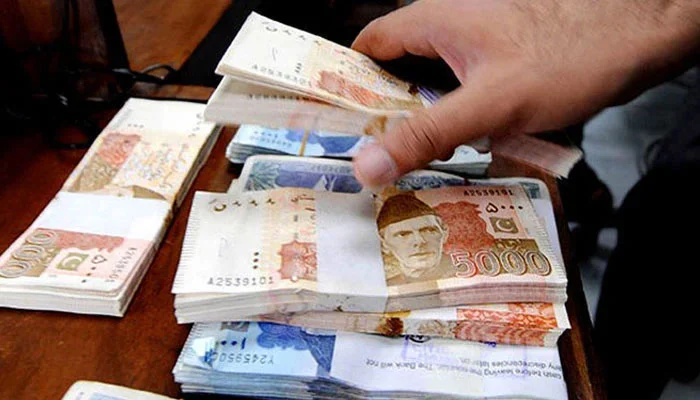ISLAMABAD – Amid ongoing fiscal constraints and IMF program requirements, the Annual Plan Coordination Committee (APCC) on Monday approved a national development outlay of Rs4.083 trillion for the fiscal year 2025–26. The proposed allocation includes a federal share of Rs1 trillion and a significantly larger provincial development budget of Rs2.8 trillion.
Despite the Centre’s limited fiscal space, the Sustainable Development Goals (SDGs) Achievement Program (SAP) maintained a dedicated bloc allocation of Rs50 billion for treasury-aligned parliamentarians.
The macroeconomic framework for the next fiscal year projects a 4.2% GDP growth rate—up from 2.68% in the current year—with inflation forecast at 7.5%.
Key Allocations and Priorities
The federal Public Sector Development Programme (PSDP) will include Rs270 billion in foreign aid, with Rs756 billion allocated to ministries/divisions and Rs244 billion to state-run corporations. Infrastructure projects will receive Rs644 billion, including:
-
Rs332 billion for transport and communication
-
Rs144 billion for energy
-
Rs109 billion for water
-
Rs59 billion for housing and physical planning
The social sector will receive Rs150 billion—down from Rs200 billion in the previous year. The education budget (including the Higher Education Commission) is reduced to Rs63 billion, while health funding drops to Rs22 billion.
Allocations for special areas also saw cuts: Gilgit-Baltistan and Azad Jammu & Kashmir will receive Rs63 billion (down from Rs75 billion), and the merged districts of KP will receive a constant Rs70 billion.
The plan allocates Rs53 billion to science and IT, Rs9 billion to governance, and Rs11 billion for food, agriculture, and industry combined.
Fiscal Challenges and Policy Adjustments
The APCC highlighted structural constraints, including a throw-forward liability of Rs10.2 trillion across 1,120 ongoing projects—some of which could take over a decade to complete at current funding levels. It recommended a moratorium on new Departmental Development Working Party (DDWP)-level projects for two years, and prioritization of foreign-funded and near-completion schemes.
More than 118 underperforming or redundant projects, primarily approved at the DDWP level, have been marked for closure, potentially saving Rs1,000 billion. Rs84 billion was re-appropriated to fast-moving projects, while Rs80 billion was diverted for priority initiatives like solar tube wells in Balochistan.
In its recommendations to the National Economic Council (NEC), the APCC proposed measures to improve PSDP efficiency, including:
-
No source deductions of Cash Development Loans from PSDP releases
-
Prioritization of high-impact and foreign-funded projects
-
Restriction on new provincial-nature projects, except in underdeveloped districts
Provincial Responses
Sindh and KP voiced dissatisfaction over unfulfilled federal commitments. Sindh’s Minister Syed Nasir Shah noted that several projects were shifted to Public-Private Partnership (PPP) mode. KP’s Finance Minister Muzammil Aslam highlighted that critical provincial projects were dropped from the PSDP and pointed out an alarming rise in pension liabilities.
Economic Outlook and Strategic Vision
Planning Minister Ahsan Iqbal reiterated the government’s commitment to development amid tight fiscal space. He emphasized Pakistan’s ambition to become a $1 trillion economy by 2035 and a $3 trillion economy by 2047, supported by performance-based planning and increased provincial coordination.
He cited a 3% primary budget surplus during July–March FY2025 as a sign of improved fiscal discipline, compared to 1.5% in the same period last year. Despite a modest 2.7% GDP growth this year, he noted a 4.8% rebound in industrial output and steady growth in services.
Iqbal acknowledged the added fiscal pressure due to increased defense spending following recent border tensions but emphasized the need to invest in people-centric sectors like health, education, and technology to build national strength.
FBR Reforms and Revenue Enhancement
Separately, Prime Minister Shehbaz Sharif chaired a review meeting on Federal Board of Revenue (FBR) reforms. He called for international third-party validation of ongoing initiatives and expressed satisfaction over the implementation of the faceless customs assessment system, which has improved transparency and revenue collection.
The meeting was informed of progress in automating tax systems and the upcoming launch of a simplified digital tax return platform in Urdu and other local languages to enhance public compliance.
Ministers for Law, Information, and the Chairman of FBR were among the senior officials who attended the meeting.




